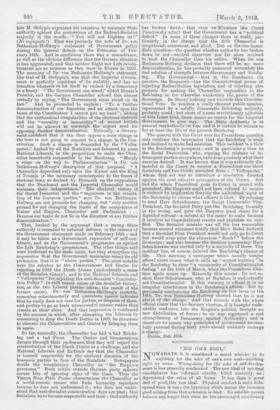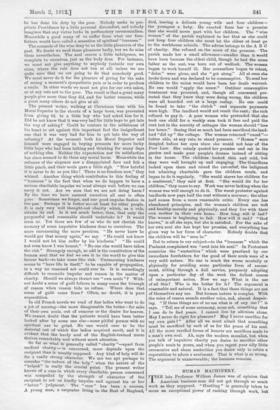"HIS OWN SOUL." N OWADAYS it is considered a moral mistake
to do anything for the sake of one's own soul—anything right we mean. Wrong-doing for the sake of self-develope meat is less generally condemned. The new ideal of 'spirited unselfishness has reformed charity, killed austerity, an depreciated the value of all forms. It has done a great deal of good, this new ideal. Physical comfort is more wide- spread than it was; the hypocrisy which denies the immense good arising from that extension is dead. No sensible person believes any longer that when he has encouraged mendicancy
he has done his duty by the poor. Nobody seeks to pro- pitiate Providence by a little personal discomfort, and nobody imagines that any virtue lurks in perfunctory ceremonialism. Meanwhile a good many of us suffer from what our fore- fathers would have called a sensation of spiritual "leanness."
The counsels of the wise deny to us the little pleasures of the past. No doubt we used those pleasures badly, but we do miss them nevertheless. The soul craves a little indulgence, we complain to ourselves, just as the body does. For instance, we must not give anything to anybody (outside our own class, where the rule does not run at all) unless we are quite sure that we are going to do that somebody good.
We must never do it for the pleasure of giving for the sake of easing a moment's sympathetic pain or in order to produce a smile. In other words we must not give for our own sakes, or at any rate not to the poor. The result is that a great many people give more than they did, and for better reasons, while a great many others do not give at all.
The present writer, walking at Christmas time with his Moral Superior in the streets of a large town, was prevented from giving 6d. to a little boy who had asked him for it.
Did he not know that it was very bad for little boys to get into the way of asking ? Could be venture in the selfishness of his heart to set against this important fact the insignificant one that it was very bad for him to get into the way of refusing ? At the moment both his Moral Superior and himself were engaged in buying presents for more lucky little boys who bad been talking and thinking for many days of nothing else. Neither the expectation nor its satisfaction has since seemed to do them any moral harm. Meanwhile the
refusers of the sixpence saw a disappointed face and felt a little pinch, and their souls gave a little sigh. "How hateful
it is never to do as you like ! There is no freedom now," they
-whined. Another thing which contributes to this feeling of " leanness " is the fact that when we do happen to have a serious charitable impulse we-must always wait before we can
carry it out. Are we sure that we are not doing harm ? By the time we have assured ourselves all zest is often gone. Sometimes we forget, and our good impulse flashes in the pan. Perhaps it is better so—at least for other people. It is only very well thought-out charity which, as a rule,
attains its end. Is it not much better, then, that only the
purposeful and reasonable should undertake it P It would seem so. Yet there are few of us who do not cherish the memory of some impulsive kindness done to ourselves. The more unreasoning the more precious. "He never knew he would get that money again," we say. "He could not know
I would not let him suffer by his kindness." "He could
not even know I was honest." "No one else would have taken the risk." Strangely enough, so odd is the constitution of the human soul that we feel we owe it to the world to give this favour back—to take some like risk. Unreasoning kindness seems to "have life in itself," to be capable of propagation, in a way no reasoned act could ever be. It is exceedingly difficult to reconcile impulse and reason in the matter of charity. Should we always thwart our "own souls " ? With- out doubt a sense of guilt follows in many cases the triumph of reason when reason bids us refuse. Where does that sense of guilt come from P Often, no doubt, it is pure superstition.
In old French novels we read of fine ladies who went to do a job of nursing—the more disagreeable the better—for sake of their own souls, out of remorse or the desire for heaven.
We cannot doubt that the patients would have been better looked after by some one else—some pitiful person with no
spiritual axe to grind. No one would care to be the material out of which fine ladies acquired merit, and it is evident that the hardy soul of the English-trained nurse thrives remarkably well without much attention. So far as what is generally called "charity "—apart from medical charity — is concerned, more depends upon the
recipient than is usually supposed. Any kind of help will do for a really strong character. We are too apt perhaps to consider "the nature of the help" when the nature of the "helped" is really the crucial point. The present writer knows of a case in which every charitable person concerned was compelled by the strength of character of the
recipient to act on kindly impulse and against his or her " better " judgment.. The " case " has been a success. A young man, a carpenter living in the East of England, died, leaving a delicate young wife and four children— the youngest a baby. He exacted from her a promise that she would never part with her children. The "wise women" of the parish explained to her that as she could not keep four children she must let the eldest at least go to the workhouse schools. The advice belongs to the A B 0 of charity. She refused on the score of the promise. The parish made her a small allowance—smaller than it would have been because the eldest child, though he had the same father as the rest, was born out of wedlock. The woman began to work herself ill. Her counsellors began to relent, " doles " were given, and she "got along." All at once she broke down and was declared to be consumptive. To send her children to the union would have been her death warrant. No one would "apply the screw." Outdoor consumptive treatment was procured, and, though all concerned pro- tested that they knew they were doing wrong, the children were all boarded out at a large outlay. No one could be found to take "the clutch" and separate payments were high. The landlord would not remit the rent; the rich refused to pay it. A poor woman who pretended that she took one child for a weekly sum took it free and paid the rent lest in the scarcity of cottages the woman should "lose her home." Seeing that so much had been sacrificed the land- lord "did up" the cottage. The woman returned "cured "— better able, at any rate, to stand pressure. " Homes " were dangled before her eyes since she would not hear of the Poor Law. She calmly quoted her promise and sat in the garden and made poor people's dresses instead of sitting in the house. The children looked thin and cold, but they were well brought up and engaging. The Guardians looked upon them and raised the out-relief, the indignant but admiring charitable gave the children meals, and began to do it regularly. "She would starve her children for a sentiment," they said at first. "She would die for her children," they came to say. Work was never lacking when the woman was well enough to do it. The worst protester against landlords now pays half the rent without a murmur; the other half comes from a more reasonable critics. Every one has abandoned principles, and the woman's children are well and healthy morally and physically, and they live with their own mother in their own home. How long will it last? The woman is beginning to fail. How will it end P "God knows," is all she says, but she is satisfied. For the sake of her own soul she has kept her promise, and everything has given way to her force of character. Nobody doubts that the children will be "seen to."
But to return to our subject—to the "leanness" which the Psalmist complained was "sent into his soul." In Protestant countries the " austerities " which were practised by our immediate forefathers for the good of their souls were of a very mild nature. No one is much the worse mentally or physically for avoiding some particular form of amuse- ment, sitting through a dull service, purposely adopting upon a particular day of the week the dullest course of unimportant action. Now we say : What is the use of all this ? Who is the better for it? The argument is reasonable and natural. It is a fact.that these things are not of themselves any use. But human nature is complex. With the voice of reason sounds another voice, sad, almost despair- ing. "If these things are of no use what is of any use P " it says. "Tell me of some ceremony, some act, something that I can do to find peace. I cannot live by altruism alone. May I never do right for pleasure ? May I never sacrifice for my own gain P" After all we must admit that something must be sacrificed by each of us for the peace of his soul All the more rarefied forms of honour are sacrifices made to a man's own soul. Ah, says the modern moralist, but when you talk of impulsive charity you desire to sacrifice other people's souls to yours, and when you regret your silly little ceremonies and sham austerities you desire only to retain a superstition to adorn a sentiment. That is what is so wrong. The argument is unanswerable; the leanness remains.











































 Previous page
Previous page